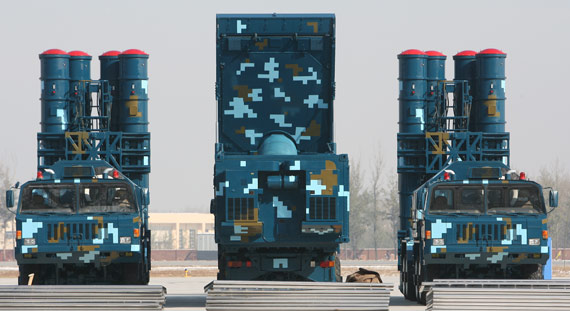
From Burak Ege Bekdil, Defense News: Turkey is strongly leaning toward adopting a Chinese long-range anti-missile and air defense system, Turkish procurement officials said, even though it may be impossible to integrate the system with its existing NATO architecture.
One senior procurement official familiar with the program said the Turkish government has concluded that the Chinese proposal was technologically satisfactory, allowed technology transfer and was much cheaper than rival proposals.
The decision to select the Chinese contender awaits final approval from Defense Minister Ismet Yilmaz and Prime Minister Recep Tayyip Erdogan. . . .
In January, Turkey restructured the $4 billion program, dubbed T-Loramids, which had originally been constructed as an off-the-shelf purchase. The contenders’ bids would remain valid, but the Undersecretariat for Defense Industries (SSM) procurement office would ask bidders to submit parallel, co-production solutions. Erdogan ordered the launch of feasibility studies on “potential co-production” of the system. . . .
The same month, SSM wrote to the bidders and asked them to send letters of intent for any co-production deal. The bidders are a U.S. partnership of Raytheon and Lockheed Martin, offering the Patriot air defense system; Russia’s Rosoboronexport, marketing the S-300; the China Precision Machinery Export-Import Corp., offering its HQ-9; and the Italian-French consortium Eurosam, maker of the SAMP/T Aster 30. . . .
“I cannot comment on how the [US] administration would react to that. But I can tell you that integrating a Chinese or Chinese-Turkish air defense system into NATO assets may not be a good idea,” a US diplomat here said.
A Western industry source said that US officials have warned the Turkish bureaucrats several times about the potential difficulties in achieving interoperability if Turkey decided to go for a Chinese or a Russian architecture.
“I see that the Turks remain defiant. But I do not think it would be practically possible to integrate either the air defense or the anti-missile components of the planned Turkish-Chinese architecture into NATO radars,” a London-based Turkey specialist said. “The Turks would have the same problem if they chose the Russian system, but I think for the Americans, China represents a more direct threat.”
About half of Turkey’s network-based air defense picture (radars) has been paid for by NATO, said a Turkish defense official familiar with NATO work. They are part of the NATO Air Defense Ground Environment. He did not comment on potential problems if Turkey wanted to make the planned system interoperable with these assets. (photo: SOHA News)
Image: soha%206%2026%2013%20China%20MD.jpg
